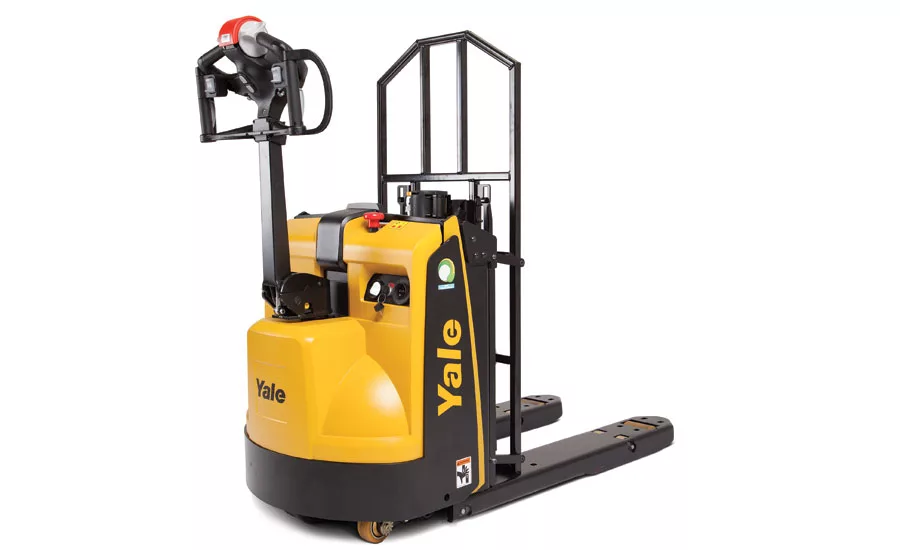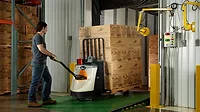Safety fuels carts, handtrucks market
Beverage delivery drivers are turning to powered delivery systems to make work safer and more efficent

Yale Materials Handling Corp.’s MPB045VG walkie pallet truck with a DSD package lifts and lowers delivery loads for workers. (Image courtesy of Yale Materials Handling Corp.)
As beverage delivery drivers are tasked with making more frequent deliveries to better meet the needs of their direct-store-delivery (DSD) customers, their employers are turning to powered delivery systems to make this work safer and more efficient.
“Most injuries don’t happen from one-time occurrences, they happen from repetitive movements over time like lifting a hand truck or keg on and off a truck multiple times per day,” says Andrea Horner, vice president of marketing for Standish, Mich.-based Magline Inc. Powered options can help reduce stress on delivery personnel by taking on some of the load for them, she adds.
For example, the Magliner CooLift system uses hydraulic power to steadily and stably raise and lower loads for the delivery driver. The operator can wheel the CooLift to a prepacked rainbow pallet, use the hydraulic lift to move the load onto the cart, and then use the same hydraulic system to lower the load onto the store, storeroom or warehouse floor. By comparison, when using a traditional hand truck, the delivery driver would need to manually lift cases or smaller pallets onto and off of the hand truck for delivery. A powered system, thus, reduces the chances of injuries and fatigue, which means that the driver can stay on the job longer and safely complete more deliveries, according to the company.
Yale Materials Handling Corp. recently added a DSD package for its MPB045VG walkie pallet truck. This solution automatically lifts and lowers loads for delivery drivers. For added safety, the pallet truck is equipped with a patented, ergonomic DSD handle that allows the operator to stand next to the truck and use one hand to control it, explains Shelley Bell, manager of industry marketing for the Greenville, N.C.-based company. This, in turn, gives the operator full, end-to-end visibility of the truck to reduce accidents. Once inside the store, the truck can be driven at creep speed to allow for optimized maneuverability, visibility and control in congested store aisles, she notes. In addition, the pallet truck is equipped with a load retention strap system that uses a single 2-inch seat belt-style ratcheting and locking mechanism to keep a variety of load shapes and sizes secure as the pallet truck navigates different terrains, she says.
With the ability to handle larger loads and pre-packed pallets, powered delivery systems can help reduce delivery times. For example, the Magliner CooLift delivery system can handle loads as heavy as 1,500 pounds. In a side-by-side comparison with a traditional hand truck, which requires the operator to manually load individual cases, the CooLift reduced beverage DSD time by 46 percent, according to the Magline website. “Pre-sell, pre-pick systems can reduce account service time, which allows drivers to deliver more product per day,” Horner says. “Since launching cart systems, Magline has helped many distributors increase productivity and reduce costs.”
Yale’s MPB045VG walkie pallet truck with a DSD package also boosts efficiency through flexibility. The movable load backrest can be adjusted through quick latch and pivot arms to handle multiple pallet types. This streamlines processes for time-sensitive deliveries, Bell says.
In addition, the MPB045VG’s lithium-ion battery reduces downtime. The battery is certified under the UL 583 standard for industrial trucks and can last five times longer than traditional lead-acid batteries, Bell says. When the battery needs to be recharged, the operator can plug it into any 120-volt outlet, meaning the walkie truck can be charged at a warehouse or distribution center or in a truck trailer between deliveries, she notes.
In fact, Bell expects that lithium-ion batteries could be the next big innovation for carts and hand trucks. “As operations look to find new ways to be more productive and eliminate costs wherever they can, lithium ion is increasingly becoming a go-to power source,” she explains. A lithium-ion pack has an average lifespan of five or more years, which is about five times longer than traditional battery solutions, she notes. This reduces replacement battery costs during the life of the truck. Plus, the smaller 6-inch battery compartment size allows for more compact cart and pallet truck designs that can perform well in the tight and congested spaces in retail stores, she explains.
Delivery truck upgrades
As the beverage industry trends toward using powered distribution systems, delivery trucks also are receiving a power up. Powered liftgates help safely maneuver powered carts and pallet trucks as well as pallets of beverages into and out of back-loaded truck trailers.
“Liftgates are designed to reduce injuries from reaching and straining as well as slips and falls,” says Anita Byrne, vice president of sales for Cincinnati-based Leyman Lift Gates. The liftgate lowers pallets and carts to the ground so that the delivery driver does not have to unload them manually, thus reducing physical strain and the chance of repetitive motion injuries, she explains. These decreased physical demands and injury rates improve driver retention, she adds.
Liftgates also add flexibility to trucks, points out Greg Ellis, president of PDC, York, Pa. “Liftgates provide the opportunity to service accounts that have a dock and those that do not have a dock on the same route,” he explains. “The benefit, therefore, it is not needing to send out two trucks in the same geographical area.”
Before selecting a liftgate for a truck, experts suggest considering a few important features. A primary feature is load capacity. Kurt Walker, director of marketing and sales for Anthony Liftgates Inc., Pontiac, Ill., recommends choosing a liftgate that can handle at least 5,000 pounds. “This allows [enough] capacity for a full load of beverages, a pallet, a moving device such as an electric pallet jack, and the driver with a little extra to spare.” He adds that beverage companies also should opt for liftgates with large platforms to accommodate all of these items.
Anthony’s MRT series of direct hydraulic large rail liftgates meets these requirements. This portfolio includes painted, galvanized or stainless steel construction options for functionality in a variety of climates as well as steel or aluminum platforms options. In addition, its MRT-SL liftgate includes a patented side-loadable platform, which allows the operator to load and unload goods and equipment on three sides of the platform.
Beverage companies also should consider the reliability of their chosen liftgate solution. If a liftgate stops working in the field, it might be difficult or even impossible to remove heavy loads from the truck. Leyman’s liftgates are equipped with the proprietary Maintenance Minder, which provides simplified diagnostics and reminds the operator to conduct preventative maintenance every 3,000 cycles to ensure proper operation in the field, Byrne says. This helps reduce the risk of unexpected downtime.
Lastly, beverage companies should seek out safety features, like slip-resistant surfaces and other barriers that prevent falls. Santa Fe Springs, Calif.-based Maxon Lift Corp.’s Columnlift style gate, which is its most popular option for the beverage industry, is equipped with side chains that create a stable platform and prevent the operator from falling off the platform, explains Anton Griessner, vice president of marketing. The solution includes a retention ramp that protects loads from being accidentally dropped, he adds.
Leyman Lift Gates’ Byrne expects that even more safety developments are on the horizon for liftgates. Potential updates include improved area markers for increased visibility, enhanced slip-resistant designs and automatically deployed safety features that reduce the chances of accidents and operator oversight.
“Liftgates with built-in safety systems are a worthwhile investment in the most important asset of a beverage delivery company — its people,” Byrne says. By reducing the physical demands of the job and keeping operators safe, beverage companies create a more comfortable and efficient working environment for their delivery personnel, she adds. BI
Looking for a reprint of this article?
From high-res PDFs to custom plaques, order your copy today!






